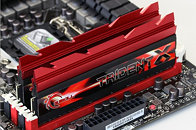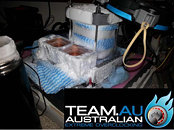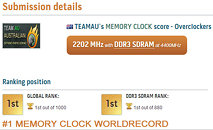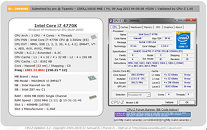Friday, August 9th 2013

G.SKILL TridentX Reaches DDR3 4400 MHz
G.SKILL International Co. Ltd., the world's leading manufacturer of extreme performance memory and superior solid-state storage, tops the memory frequency world record chart once again with "G.SKILL TridentX" overclocked to an amazing DDR3 4400 MHz. Using 4th Generation Intel Core i7 4770K, ASUS Maximus 6 Impact and a steady flow of LN2, professional overclocker James "YoungPro" Trevaskis from TeamAU were able to push the factory spec G.SKILL TridentX DDR3 3000MHz C12 4GB stick to the world's fastest DDR3 4400MHz CL13.For more information and validations, please visit this page.




27 Comments on G.SKILL TridentX Reaches DDR3 4400 MHz
Forget RAM timings. Useless rig. But Haswell is like this, what can anybody do? I wonder if they can do this on a AMD-based system.
The hyped RAM frequencies are designed to get people to throw away their money because they don't understand PC s well enough to know they are being duped.
An APU using the onboard GPU does see larger gains than others because that iGPU is using system ram which is the bottleneck in some cases.
www.tomshardware.com/reviews/memory-bandwidth-scaling-trinity,3419.html
In short, massive is an exaggeration, respectable is more fitting. Unless they guy in the video came up with something else, I didn't watch it (and I never will, and I assume it's a guy).
P.S.
Note how they had to underclock the cpu to achieve that huge RAM OC.
Last 5 years I feel growing gap between fancy numbers and real performance. From cores 2-> 4-> 6-> 12-> 24 difference getting smaller and smaller. About the same with the flooding around "memory announcements". Nice to know we can theoretically run 4400 instead 1600 but concerning performance we gain little if something. To gain something we must sacrifice nearly as much. Play with numbers instead real performance gain, DDR4 around the corner. Like a beating a dead horse :)
Haswell on a way wondering will I be blessed to feel once again in my life as much improvement in user experience as it was with my first dual socket mobo back in 2000 compared to single cpu models I had before :D
4770K@4.8GHz /RAM 1866MHz vs 1.8GHz/4400MHz.
We all know DDR3 1600-1866 is the sweet spot and memory speed over that show little to no gains in most real world applications including games.
CL13 4400MHz will be faster than CL9 1600Mhz.
Originally Posted by EarthDog View Post
CL13 4400MHz will be faster than CL9 1600Mhz.
Yes but you really can`t run this CL13 4400MHz on air but you can run 1600Mhz CL7 or even @2000
Thats why I call it "nice to know"...
When I was looking memory for Haswell I discovered good kits giving to run memory on tight timings were actually released with SB/IB. Some of them not even available anymore. Seems all manufactures are concentrated on speed race- bigger numbers are pretty.
I would still bet though, Nadurn, that even with 1.8GHz CPU speed (KING?!!!) that the memory bandwidth will still beat out stock haswell and 1600MHz CL7...
A car designed to accelerate like crazy and be the fastest for 1 mile wont be very useful of a car as it might burn 10x as much fuel and have 1/20th of the range of a Honda civic. Hell it might have a top speed that's really low just because it's designed for acceleration so it's performance is not great, but specifically its acceleration is.
In the same way the RAM aren't designed for the highest performance or stability but for the highest clock rate. Asking for benchmarks or comparing it's performance to other lower clocked RAM is a moot point as it's a given